Choosing the Best H55/H57 Motherboard, Part 2
by Rajinder Gill on February 22, 2010 2:00 AM EST- Posted in
- Motherboards
Far Cry 2
Featuring fantastic visuals courtesy of the Dunia Engine, this game also features one of the most impressive benchmark tools we have seen in a PC game. For single GPU results we set the performance feature set to Very High, graphics to High, and enable DX10 with 2xAA.
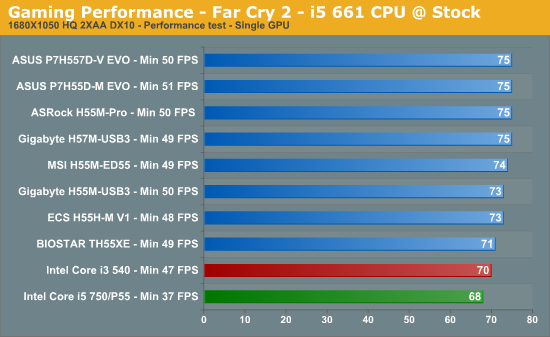
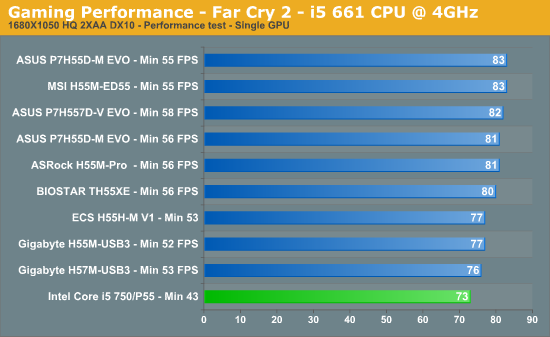
Warhammer 40K: Dawn of War II
We are big fans of the Warhammer franchise, especially Dawn of War II. One of the latest RTS games in our library is also one of the more demanding titles on both the CPU and GPU. We crank all options to Ultra, enable AA, and then run the built-in performance benchmark for our result.
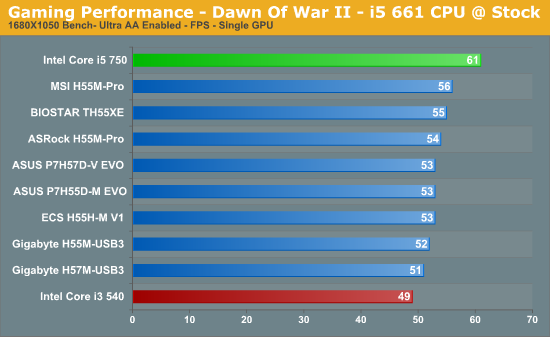
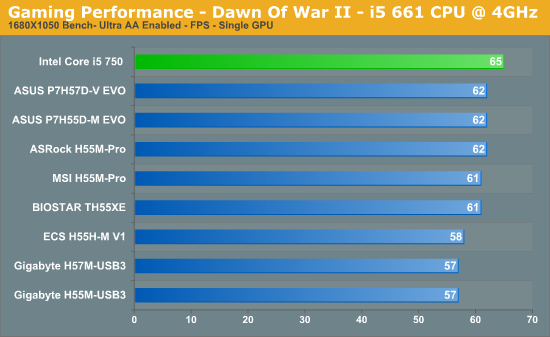
AutoCAD 2010 x64—Cadalyst 2008
We utilize AutoCAD 2010 x64 and the Cadalyst Labs 5 benchmark.
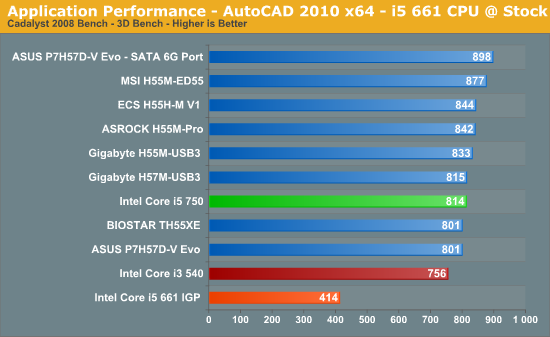
The Cadalyst benchmark is sensitive towards HDD performance, showing a fair amount of swing between boards. We're not sure on the exact cause of variance between boards of the same chipset, but MSI clearly have an advantage (using the H55 chipset). As expected, there is a small boost using ASUS' SATA 6G ports with our OCZ Vertex SSD.










56 Comments
View All Comments
Swivelguy2 - Monday, February 22, 2010 - link
Okay, USB 2 transfers a gigbyte in 36 seconds. This is consistent with the rated spec of 480 Mbit/s. Isn't USB 3 supposed to be 10x faster? What's causing the limitation? Is it the implementation by Asus and Gigabyte (like attaching the USB 3 to too narrow of a PCI-e lane)? Is it simply the write speed limitation of the USB HDD used? If the latter, why not write to some flash memory to see if the results improve?C'mon Anandtech, I know you can do this right - if you're going to benchmark and discuss the USB 3 capabilities of these boards, do that!
Rajinder Gill - Monday, February 22, 2010 - link
Good point. In-depth analysis of USB 3 & external HDD's etc will be offered up in a dedicated article.later
Raja
JarredWalton - Monday, February 22, 2010 - link
USB devices have always had some level of overhead compared to SATA devices. USB 1.1 devices never actually achieved 12Mb/s but were closer to around 8Mb/s (1MB/s) maximum. USB 2.0 is rated at 480Mbits, which translates into 57.22 MiB/s (remember that Windows uses 2^20 MiB for transfer rates instead of 10^6 MB). However, there's overhead and the maximum sustainable transfer rates on USB 2.0 tend to be closer to ~38MiB/s. At that speed, most conventional HDDs can easily saturate USB 2.0, but they're not significantly faster (i.e the fastest HDD is going to be in the realm of 100 MiB/s).Move to USB 3.0 and the maximum theoretical data rate is 572 MiB/s, but there's still overhead that limits performance to 4 Gb/s instead of 4.8Gb/s, and it looks like transfer rates of up to ~380MiB/s will be considered "ideal". Even the fastest SSDs aren't going to come close to 380 MiB/s right now, as they would need external enclosures and SSDs with SATA6G support.
With USB 3.0, a 1TB HDD transferring data at around 93MB/s is very close to the speed of a 1TB drive connected via SATA, so the HDD is now the bottleneck for USB 3.0. If Raja tested with a fast SSD, we could see if USB 3.0 can get up to ~250 MB/s, but we can't test if it can achieve any better than ~43% of the theoretical throughput without SATA 6G.
Swivelguy2 - Wednesday, February 24, 2010 - link
I'm sure we can come up with a way to challenge USB 3 and make sure the boards are actually performing to the spec. There are two USB 3 ports on the motherboard, how about writing large files to SSDs attached to each one? How about copying a file from one to the other? How about streaming off of a USB 3 camera or two?michal1980 - Monday, February 22, 2010 - link
Firstly, thanks for ripping into these compaines.Secondly; Any plans on testing any of the itx boards coming out? Zotac?
Thridly. How come reference intel boards are never tested? It would be nice to see how intel mobo's are right out of the gate.
Rajinder Gill - Monday, February 22, 2010 - link
Hi,1) Couple of ITX reviews are in the pipeline - including the Zotac H55 and Intel M-ITX 'Jet Geyser'. The Intel review is what I'm working on right now (board is due for release mid-march with an MSRP circa $125)
2) We've currently got 3 Intel boards in lab due to be reviewed. The Intel 'Jet Geyser' is first. The two other boards in-lab from Intel are the P55 M-ATX and ATX models, reviews for both should be up sometime in March..
Hope this helps..
-Raja
The Wasp - Tuesday, February 23, 2010 - link
Raja,Any chance you'll be reviewing the new ECS H55H-I ITX motherboard?
How about the Giada MI-H55?
I'm trying to pick the best 1156 ITX motherboard, so it would be great to get some more in-depth info on all of the options.
Thanks!
Jon
Rajinder Gill - Tuesday, February 23, 2010 - link
Hi Jon,We're focusing on the Intel and Zotac M-ITX boards at present,so it will be a few weeks before we can look at the models you mention (will def try and add them in if possible somewhere down the line).
regards
Raja
The Wasp - Thursday, February 25, 2010 - link
Hello again,I don't know if it's available, but if you could include the Jetway NC97 that would be awesome too!
Jon
grazapin - Monday, February 22, 2010 - link
Based on past experience, how do you expect the Intel boards to compare to the other manufacturers?Strange that Intel is only using the H57 in the Mini-ITX board and not in the larger two. Seems counterintuitive, like in many cases aren't you more likely to want the RAID features in a larger case that can hold more drives, therefore accommodating a larger motherboard also? Maybe that's just my preference or assumption.